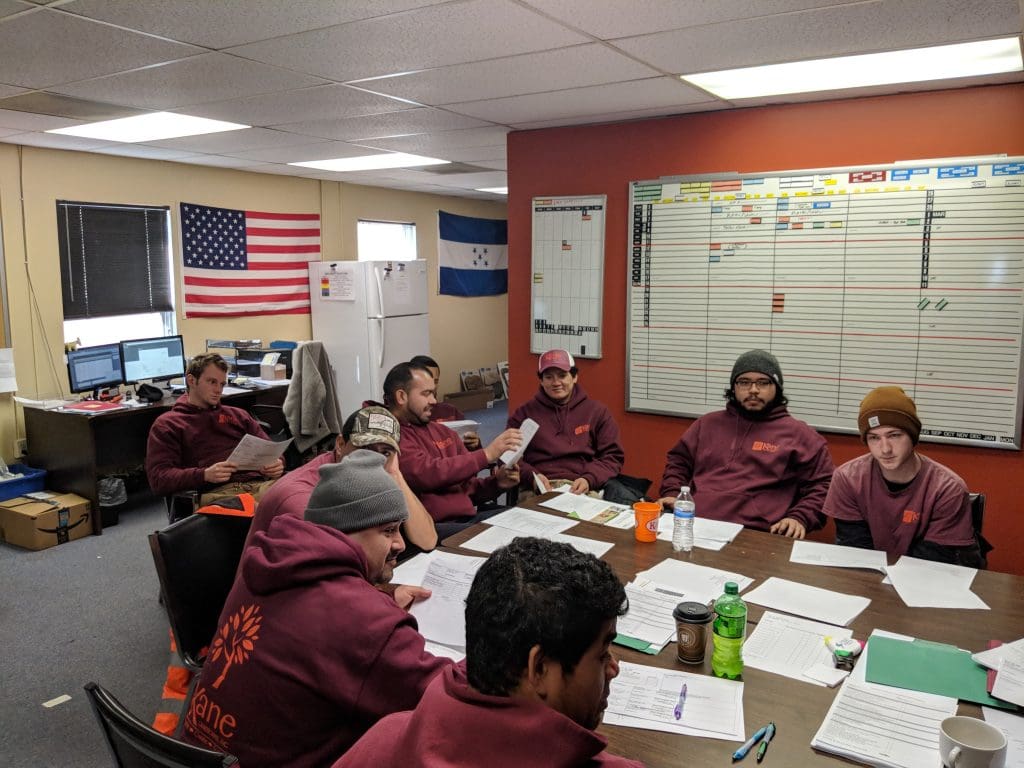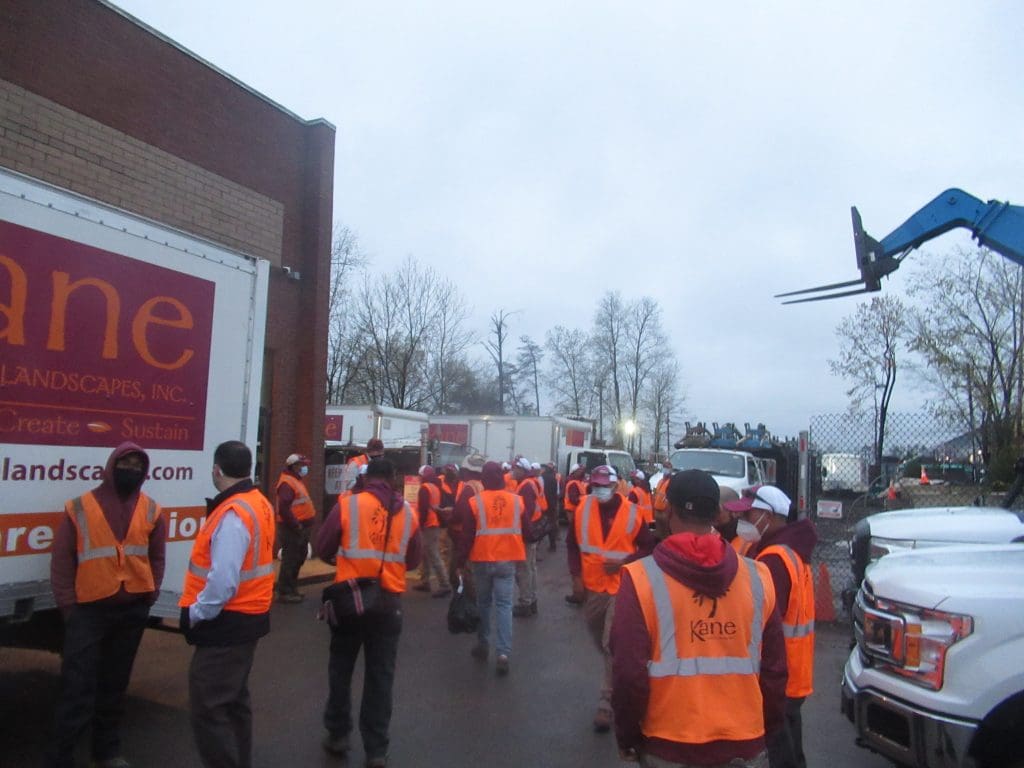
In the lawn and landscape business, there are certain elements that are completely out of your control, such as the weather. While rainy days are inevitable, they don’t necessarily have to be a total wash of a day.
Brandon Sheppard, a Weed Man multi-unit franchise owner with franchises in Virginia and Maryland, says the manner in which you approach rain days reflects how well you approach the management of your technical department.
“It’s very easy for a production manager to be managed by the job and not the other way around,” Sheppard says. “You end up with the tasks of the day setting the daily schedule instead of you, something that is only compounded when weather is thrown into the mix.”
How to Stay Productive
So when Mother Nature gives you rainy days what should you do to stay productive?
First, you need to have a clear concept of what productivity means for your company. Sheppard says without a clear vision, you’ll be scrambling to find ‘jobs’ for people to do and end up underutilizing your team’s time and resources.
“Your team knows when you don’t have a plan and if they feel like you’re wasting their time it can impact how they view you as a leader,” Sheppard says.
Sheppard adds that by minimizing rain days, you can keep the paychecks of your employees uniform as predictable pay is a major benefit to any employee. Reduced pay due to lost weather days can be a real source of anxiety to your team.

Photo: Kane Landscapes
At Bay Landscaping, based in Mobile, Alabama, they have their crew leaders and managers come in to do maintenance on their equipment and clean the shop on rainy days.
Josh Kane, president/head designer of Kane Landscapes, based in Potomac Falls, Virginia, says when there is a high probability of rain in the weekly forecast, they develop a secondary schedule to adjust deliveries, subcontractors and any work that should not be done in or after heavy rain.
“If it is a heavy rain we often use the morning for training with the field teams and then have the foremen assist the mechanic on getting ahead on preventative maintenance on equipment as we will most likely run long days to catch up – preventing the mechanic from staying on his schedule,” Kane says.
He says their training vary from safety topics to breaking into more specific topics for each division, like the proper use of larger equipment for the landscape division.
At Weed Man, their technicians report to work rain or shine, unless told otherwise. Creating the expectation that every day is a workday helps the team show up with the expectation of being productive for the entire day.
Sheppard says training is part of their rain day strategies. One of their main focuses is improving the abilities of their technicians to interact with the clients.
“We train on all manner of customer interaction principles to build both skills and confidence,” Sheppard says. “We are firm believers in the power of role play when it comes to training on sales or customer retention training. It’s not enough to ‘know the material;’ mastery and confidence come from being able to employ both the skills and knowledge and there is no substitute to working with the information. To make this practice as effective as possible we routinely use managers from our sales and customer service departments to lead both the training and the role play.”
He says devoting time to train and practice their customer service skills has led to significant jumps in their overall customer retention rate and sales revenue generated by each technician.
Monitoring the Weather
Hank Parker, president of Bay Landscaping, says they don’t schedule for rain days as they have a ton of rain in their region and have to deal with it on a regular basis.
“We have a lot of rain in our area so we always report to work and will work until it starts raining and we can’t work anymore,” Parker says. “When rain starts we have the crews try to wait it out. If rain doesn’t stop within an hour we call it.”
He says the only time they will cancel the night before is if they have a major storm moving in and know they won’t be able to get anything accomplished or if it’s too dangerous to have their people on the roads.
Sheppard says on days when there is a higher probability of rain they will build routes that don’t have ‘call ahead’ customers or longer drive times so if there is a window when they can work they can jump on it quickly. Rather than sending crews home after a certain period of time Sheppard says ideally you should have enough content/tasks planned to fill a full day.
“Bringing your employees in for only a partial day isn’t respectful of their time; especially if you have team members with a long commute,” Sheppard says.

Photo: Kane Landscapes
Kane says they monitor the weather and try to keep their field teams informed as many days ahead of time as possible. They will build a roster of which team members will not be available to work a Saturday if they have to make up a day lost to weather.
“We will not cancel the day ahead of time due to the inaccuracy of local forecasts; some of this is due to how the Blue Ridge mountains affect the weather in the DC area,” Kane says. “Our supervisors send out text notifications listing if there is a dispatch delay, if we are having a training or which crews are or are not working by 6 a.m. the morning of the rain.”
Kane Landscapes has a policy where if they cannot dispatch their crews by 10 a.m. then they will not go out for the day to prevent the additional unbudgeted drive time.
“If dispatched after 10 a.m. the crews will not be able to complete their routes and will have to drive back to the area again another day,” Kane says. “If we have multiple days of rain, we will adjust this policy to ensure we can complete the contracted work by the end of the week.”
Keep Calm and Carry On
Parker says they will work through the rain if it’s light and misty, but acknowledges it affects the productivity and efficiency of the jobs. Sheppard says it’s not very often they’ll still try to do their work despite the rain. While some of their applications are unaffected by the rain, rain often makes the application itself difficult.
Kane says some of the tasks they will do in the rain consist of simple, smaller clean-up work or warranty work where the quality of the work will not be affected by light rain. He says they’ll also move machines and make deliveries if needed.
“Due to our work on high-end residential properties we tend not to work on properties in the rain,” Kane says. “Often we will move materials or equipment to or from sites. Even if the work we are performing may not be detrimental to the property, the assumption by clients is we might be damaging the turf or plants, so we tend to err on the side of caution.”

